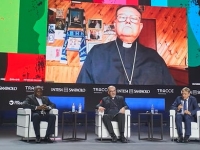Miscellaneous
ARTISANS OF PEACE. THE PASSION TO CONCILIATE
Building peace and seeking forgiveness
USPA NEWS -
The war in Ukraine made us realise that the peace enjoyed by Europe after 1945 was not to be taken for granted. In recent years we have too often forgotten about the wars and the many conflicts in other parts of the world. In Africa and the Middle East many people live under political oppression, suffer poverty, risk persecution and are killed for ethnic reasons. The Church has always been committed to overcoming conflict and violence, trying to foster dialogue and forgiveness. Now more than ever it is paramount to express this passion to reconcile even in situations that seem unresolvable in order to support all those who want to build peace, starting from their own lives.
H.Em. Card. Dieudonné Nzapalainga, Archbishop of Bangui, Central Africa; H.E. Msgr. Paolo Pezzi, Metropolitan Archbishop of the Mother of God in Moscow; H.B. Pierbattista Pizzaballa, Patriarch of Jerusalem of the Latins. Introduced by Bernhard Scholz, President of the Meeting for Friendship among Peoples Foundation.
Rimini, 08/20/2022 - The construction of peace and the search for forgiveness are the messages that come from the opening panel of the Rimini Meeting. On the subject came the contributions of the Metropolitan Archbishop of the Mother of God in Moscow, Monsignor Paolo Pezzi, the Patriarch of Jerusalem of the Latins, Father Pierbattista Pizzaballa and the Archbishop of Bangui, in Central Africa, Cardinal Dieudonné Nzapalainga. Not just Ukraine. The call for peace has reached from the Middle East to the African continent.
Israelis and Palestinians do not want to "hear about the so-called peace process after the many failures and betrayals of that process", began Father Pizzaballa. What unites them is "the lack of mutual trust". "If today it is true that talking about justice and peace in the Middle East means being on the side of those who fight against windmills - added the Patriarch - it is true that the desire for peace and justice must find in everyone's place, especially in who has responsibility ".
A strong cry for peace also came from Moscow. But above all, the invitation is to forgive.
"For the world, peace is the establishment of a certain power, and usually - who knows why - it is always postponed to a future and who knows why there must be some, usually the weakest and poorest, who will have to make certain sacrifices while others do not. The peace that the world gives is a lie ", explained the Metropolitan Archbishop of the Mother of God in Moscow in a video link." We can try as hard as we want - added Mgr. Pezzi - but we will not achieve peace afterwards a certain stage of a certain journey. I think we should remind ourselves more often that hatred, malice, are not part of our human experience. It is something that enters because we let it in, it is the sword of Satan, it is lies " The experience of "forgiveness" is, for Monsignor Paolo Pezzi, the key to winning the war and to achieving peace. "Without the experience of forgiveness one cannot live", Pezzi concluded.
"For the world, peace is the establishment of a certain power, and usually - who knows why - it is always postponed to a future and who knows why there must be some, usually the weakest and poorest, who will have to make certain sacrifices while others do not. The peace that the world gives is a lie ", explained the Metropolitan Archbishop of the Mother of God in Moscow in a video link." We can try as hard as we want - added Mgr. Pezzi - but we will not achieve peace afterwards a certain stage of a certain journey. I think we should remind ourselves more often that hatred, malice, are not part of our human experience. It is something that enters because we let it in, it is the sword of Satan, it is lies " The experience of "forgiveness" is, for Monsignor Paolo Pezzi, the key to winning the war and to achieving peace. "Without the experience of forgiveness one cannot live", Pezzi concluded.
“Let us never forget that violence generates violence - underlined H.Em. Card. Dieudonné Nzapalainga, Archbishop of Bangui -. We must learn to get out of this spiral and logic of war that wants to solve everything with weapons. The man has not yet learned the lessons of Hiroshima and Nagasaki. I ask to have the courage to change things, promoting the culture of non-violence and peace for another humanity. And here in Italy. If I may ask you something, if you have Ukrainian and Russian communities, try to build bridges so that you can dialogue and work with these communities, share food and pray with these communities. This is how we will begin to sow the seeds of peace ”. "True peace - concluded the cardinal - cannot be achieved only with the use of force, but is achieved when the causes of conflict and war are known".
Liability for this article lies with the author, who also holds the copyright. Editorial content from USPA may be quoted on other websites as long as the quote comprises no more than 5% of the entire text, is marked as such and the source is named (via hyperlink).






